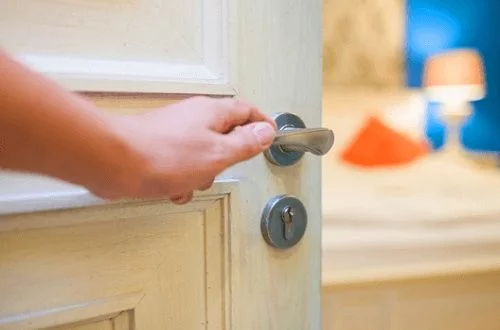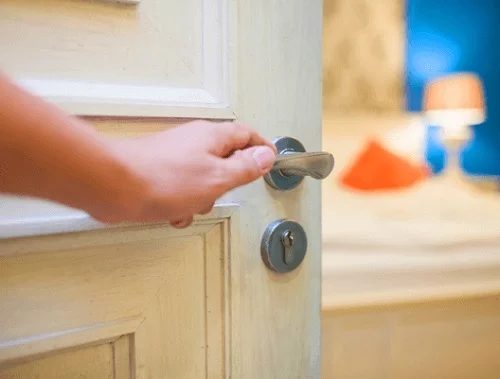4 Feng Shui Tips For Strong Doors
Many specific ideas on just how to live your life, including how to decorate your home and the best way to eat, have come from the Eastern part of the world. Most of these practices stem from ancient times and have deep roots in the religions and cultures that are most prominent there. Feng Shui is one of these things. One of the most important parts to consider is Feng Shui tips for doors in your home, office, and business. Through the front door is where you most often enter your home; this is true for the energies in your home as well.
A large part of Chinese traditions involves creating a balance between various natural and spiritual forces to achieve the most harmony, and therefore happiness, in the current, and even the next, life. You may have heard of “yin” and “yang,” the two forces pictured as perfectly balanced in a Yin Yang.
The other most commonly known energy is the “Chi” which is a sort of life force that runs through all living things.
Concepts
From these concepts came the idea of Feng Shui. It is defined by the Merriam-Webster Dictionary as “A Chinese system for positioning a building and the objects within a building in a way that is thought to agree with spiritual forces and to bring health and happiness.” Feng Shui translates to mean “wind water.”
This gives the idea of fluidity and paints a beautiful flowing picture of the energies involved in the practices of Feng Shui.
Following the imagery of flowing motions, the energy enters your home and flows through as a rush of water might, entering each room available to it, and finally exiting out the back door when it is done.
Feng Shui of Doors
#1. Door Positions
If the doorways, and doors themselves, are not positioned optimally to allow this flow, then energy can become stagnant in certain areas and can turn into not-so-great energies that can overwhelm the balance of space.
To ensure correctly flowing energies, there are many things to take into consideration when planning out your space whether you’re building one from the ground up, renovating, or just simply choosing the best decorations to work with what you already have. Here are some quick tips to welcome lots of positive Chi to your space.
#2. The Front Door
You want to be able to embrace the energies in your home and allow them to move freely within. To let this happen, you want to have your front door fit as many criteria as possible starting with which way your door opens. To be able to bring in energy, you want the door to swing into the house in a welcoming fashion.
If the door opens outwards, then it will be pushing away the energy instead of allowing it to flow inside. Another important factor in having a welcoming door is to ensure that it can move in its full range of motion.
If you have anything stored behind the door (shoes, umbrellas, bulky coats) that doesn’t allow it to open fully, then relocate whatever is there; otherwise, you’re blocking the energy before it even has a chance.
Now that the door can open freely in the right direction, what does the doorway area look like? What does the front yard look like? Is it welcoming with inviting colors, well-tended plants that don’t block the door or walkway, clean steps, well-lit, and everything in good repair? If this is not the case, then you need to tidy up.
Replace your burnt-out porch light, sweep those dried leaves off the walkway, and give your flowers some TLC. Maybe your door needs a fresh coat of paint and a new knob. If your home doesn’t look inviting from the outside, then how can you expect to welcome in the positive Chi you want?
Clutter
Take a step inside now. Your door should be able to open freely because you cleared away any clutter. The same feeling that you created outside should be carried in, as well. Your front entrance should be welcoming and bright.
If it’s unusually small, having an overhead light and a mirror (Be sure not to place the mirror facing the door as it will reflect the energy right back out!) can help create the illusion of space even if it is, in fact, not there.
What else do you see? If you can see the back door, or a large enough window, facing you, then you will need to do something to interrupt that flow path because the energy will come in through the front and go straight out the back before having a chance to meander through your home.
Well-placed furniture, such as a sitting area a roundtable, or a large plant works well to create a diversion of flow.
#3. Interior Doors
Since we are working to create the best flow possible for Chi in the space, some of the same rules that apply to the front door will apply throughout the interior doors. Ideally, all the doors should swing inward, opening into the room. Sometimes this isn’t possible to do the layout of your home, but if you’re able to make it happen then definitely do.
Ensure that all doors are in good repair and look pleasing. Again, as mentioned for the front door, anything that needs repair, a new coat of paint, oiled hinges, etc. should be taken care of for optimal energy flow.
You want to move any furniture or other items (plants, clutter, etc.) out of the way of any door and doorway to allow the door to have its full range of motion available so that the passageway between rooms isn’t blocked in any way.
Something else to consider is how many doors are near each other. In Feng Shui, there’s an idea about arguing doors when there are too many in too small of a space, like a small foyer for example.
When there are too many doors, there is too much commotion for the Chi as it tries to decide which path to take.
Energies
Energies entering and exiting the areas can get mixed up, especially if some of these doors touch when opened (not enough space for the full range of motion and clear pathway that is desired, remember?).
Some new things to consider are becoming more specific with each room and area of the house. Always close the Bathroom doors (there is a whole lot of negative Chi in the bathroom that you don’t want to seep out to the rest of the space). Leave bedroom doors open for free-flowing energy.
The specific placement of a door in the space and the furniture in it also becomes important in each room. There can be entire books written in each room for the do’s and don’t’s, but a quick example would be that you’re not supposed to place your bed directly across from the door.
#4. The Back Door
In Feng Shui, the front door is by far the most important, but there are still some important things to note regarding the back door. First of all, it should follow the other common rules for all the other doors in the house about looking good, being in good repair, and not blocking and cluttering in any way.
Remember to disrupt any direct flow from the front to the back door with furniture and decor. Since the front door is most important, you want to make sure your back door doesn’t “one-up” it.
You want it to look still lovely, but have it in a more subdued color, perhaps, or not so many furnishing/decorations. Make sure it doesn’t steal the spotlight in the home.
When you happen to use your back door as your main door, then treat it as such. If it is your main entry for your home, then the energies will follow you most often through it as well.
If you’re ever in need of a new perspective of your home, or even in your life, try coming around to the front of the house and using the front door as the main door for a little while to welcome the energies onto a new pathway.
The ancient art of Feng Shui has many, many rules and ideas that support these rules. This is just a small piece of a huge puzzle.
See Also
 Sun Signs Everything Under The Sun!
Sun Signs Everything Under The Sun!

